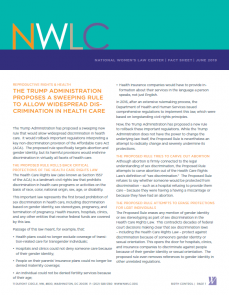The Trump Administration Proposes a Sweeping Rule to Allow Widespread Discrimination in Health Care
in Health Care
The Trump Administration has proposed a sweeping new rule that would allow widespread discrimination in health care. It would rollback important regulations interpreting a key non-discrimination provision of the Affordable Care Act (ACA). The proposed rule specifically targets abortion and gender identity, but its harmful provisions would enshrine discrimination in virtually all facets of health care.
The Proposed Rule Rolls Back Critical Protections of the Health Care Rights Law
The Health Care Rights law (also known as Section 1557 of the ACA) is a landmark civil rights law that prohibits discrimination in health care programs or activities on the basis of race, color, national origin, sex, age, or disability.
This important law represents the first broad prohibition of sex discrimination in health care, including discrimination based on gender identity, sex stereotypes, pregnancy, and termination of pregnancy. Health insurers, hospitals, clinics, and any other entities that receive federal funds are covered by this law.
Passage of this law meant, for example, that:
- Health plans could no longer exclude coverage of transition-related care for transgender individuals;
- Hospitals and clinics could not deny someone care because of their gender identity;
- People on their parents’ insurance plans could no longer be denied maternity coverage;
- An individual could not be denied fertility services because of their age; and
- Health insurance companies would have to provide information about their services in the language a person speaks, not just English.
In 2016, after an extensive rulemaking process, the Department of Health and Human Services issued comprehensive regulations to implement this law, which were based on longstanding civil rights principles.
Now, the Trump Administration has proposed a new rule to rollback these important regulations. While the Trump Administration does not have the power to change the underlying law itself, the Proposed Rule is nevertheless an attempt to radically change and severely undermine its protections.
The Proposed Rule Tries to Carve Out Abortion
Although abortion is firmly connected to the legal understanding of sex discrimination, the Proposed Rule attempts to carve abortion out of the Health Care Rights Law’s definition of “sex discrimination.” The Proposed Rule refuses to say whether someone would be protected from discrimination – such as a hospital refusing to provide them care – because they were having a having a miscarriage or because they have had an abortion.
The Proposed Rule Attempts to Erase Protections for LGBT Individuals
The Proposed Rule erases any mention of gender identity or sex stereotyping as part of sex discrimination in the Health Care Rights Law. This contradicts decades of federal court decisions making clear that sex discrimination laws – including the Health Care Rights Law – protect against discrimination because of someone’s gender identity or sexual orientation. This opens the door for hospitals, clinics, and insurance companies to discriminate against people because of their gender identity or sexual orientation. The proposed rule even removes references to gender identity in other unrelated regulations.
The Proposed Rule Would Allow Religion to Dictate Patient Care
The Proposed Rule adds a religious exemption that would allow any religiously-affiliated hospital, clinic, or health insurance company to exempt themselves from complying with the sex discrimination provisions of the Health Care Rights Law. This would allow religion to dictate patient care. For example, under the Proposed Rule, a health clinic could turn someone away because of their gender identity or sexual orientation, because they are pregnant and unmarried, or because they have had an abortion.
The Proposed Rule Would Allow More Entities to Discriminate
The Proposed Rule would change who has to comply with the Health Care Rights Law. It would limit the number of insurance plans and the number of federal health programs that must comply with the Health Care Rights Law. This would drastically change the scope of the existing non-discrimination protections.
The Proposed Rule Eliminates Important Notices that Let People Know about Their Rights
The current regulations require hospitals, clinics, pharmacies, and other health programs that must comply with the Health Care Rights Law to post a notice letting people know about their rights, assuring people that the health program does not discriminate, and letting people know how they can file a complaint if they do experience discrimination. The Proposed Rule would eliminate this requirement, leaving people unaware of their rights, including what to do if they face discrimination.
The Proposed Rule Would Make it Harder for People with Limited English Proficiency to Access the Care They Need or Know their Rights
The Proposed Rule would remove requirements that protect people with limited English proficiency. It would no longer require health programs to take reasonable steps to provide meaningful access to people with limited English proficiency who are – or are likely to become – patients, clients, or customers. The Proposed Rule would no longer require health programs to post notices letting people know about the availability of language access services, such as translators, as well as aids and services for people with disabilities. The Proposed Rule also eliminates recommendations that health programs develop a plan so that they are prepared to meet the needs of people who need language access services.
*************
The Health Care Rights Law is an important provision that ensures that everyone can access health care free from discrimination. It is still the law of the land, and courts have already applied its non-discrimination protections to those who need it most, including transgender individuals. But the Trump Administration is trying to undermine those protections with this Proposed Rule. The Proposed Rule opens the door to widespread discrimination across the health care industry, and it will harm people’s dignity, health, and lives.
